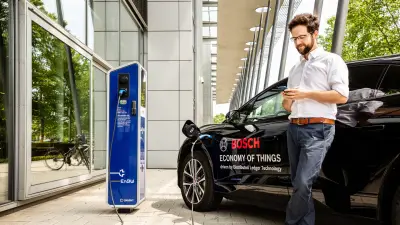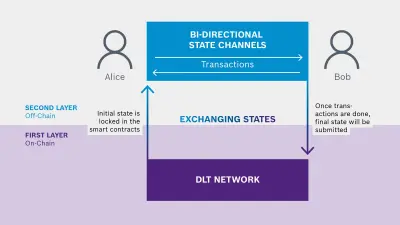Motivation/principles
What drives the research team? On which principles is the research on an Economy of Things based?
Self-Sovereign Identities (SSI) – user-focused concept for data-efficient identity management
18.11.2021 | Motivation/principles
To enable individuals, companies and things to interact, do business and network securely and digitally, a trustworthy and reliable identity system is required. If the aim is to have a system of authentication for humans, organizations and machines that is also particularly user-focused, then the approach has to center around data efficiency and data sovereignty. “Since offering users control and sovereignty over their own data is a highly desirable goal, we are working with innovation partners to establish an identity system that works without any central data collector and is operated equally by many participants,” says Dr. Nik Scharmann, Project Director of the “Economy of Things” (EoT) strategic advance engineering project at Bosch Research. Self-sovereign identities – SSI for short – is the chosen approach.

Tokenomics: fast and trustworthy machine-to-machine payment systems
10.08.2021 | Motivation/principles
Collaborative learning involves several stakeholders coming together and participating in profits through machine learning algorithms. The developers of an algorithm, the providers of cryptographically secured data and the recipients of the resulting findings all play a part in an economic cycle in the digital space. During this cycle, no distinct currency is generated inside a data space, but rather a usage right is issued for the findings. These can then either be used as a means of exchange in the data space or traded in on trading exchanges. When these usage rights are mapped out digitally, they are referred to as crypto tokens, and the overall approach is called tokenomics. “Through tokenization and tokenomics, we are creating an economic cycle in the digital space that all participants can benefit from if they act in line with certain values,” explains Dr. Nik Scharmann, Project Director for the “Economy of Things” project at Bosch Research.
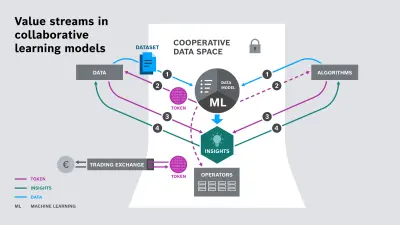
Tokenomics: incentive and remuneration systems make global digital cooperation platforms economically efficient
27.07.2021 | Motivation/principles

When Catena-X Automotive Network e.V. officially starts its work this September, the big question will be how to successfully build up Catena-X as a rapidly scalable ecosystem in which everyone involved in the automotive value chain can participate equally, and do so cost-effectively despite the complexity of this ambitious project. The aim is to create an ecosystem for the establishment, operation and collaborative use of end-to-end data chains along the entire automotive value chain in Europe – and beyond. The principles of GAIA-X are also to apply to applications in the automotive industry, meaning the exchange of data and information should be simple, efficient, self-determined, and secure, all at the same time. “Incentive and remuneration systems such as tokenomics are essential to ensuring global digital cooperation is successful for everyone,” says Dr. Tanja Rückert, Chief Digital Officer (CDO) of the Bosch Group.
Building blocks for digital sovereignty in Europe
15.10.2020 | Motivation/principles
The team behind the “Economy of Things” strategic advanced engineering project at Bosch Research is working on building blocks and solution concepts for digital sovereignty in Europe. The researchers are convinced that by establishing suitably organized marketplaces, along with payment and incentive systems, based on European values, Europe’s diversity and individuality will be leveraged as strengths to provide an efficient and globally competitive basis for a European digital economy.

The evolution of the cooperative model in the digital age
06.08.2020 | Motivation/principles
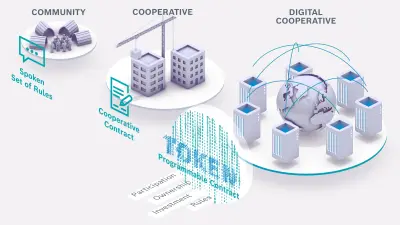
GAIA-X, the initiative to build an efficient and competitive, secure and trustworthy cloud and data infrastructure for Europe, is particularly committed to the European principles of subsidiarity, supranationality and solidarity. The team behind the “Economy of Things” strategic advance engineering project at Bosch Research is therefore convinced that the corresponding digital ecosystems can best be built on the basis of decentralized approaches and well-balanced token concepts. Accordingly, the team contributes its profound knowledge in both areas to the GAIA-X project.
Principles of the Economy of Things support GAIA-X project
15.07.2020 | Motivation/principles
In June 2020, GAIA-X, the initiative for establishing a high-performance, competitive, secure, and trustworthy cloud and data infrastructure for Europe, entered its extended project phase. Bosch has two roles to play in GAIA-X as it stands today. Firstly, it uses the digital infrastructure to develop innovations in the fields of industry, buildings and mobility. Secondly, Bosch contributes precisely the kind of technological expertise GAIA-X needs to establish trust in a sovereign data economy. This includes distributed ledger technologies (DLT), multi-party computation (MPC) and decentralized identity management (e.g. self-sovereign identity (SSI)). “Our vision is to create digital marketplaces that are built on the foundations of fairness and neutral competitive conditions. This is precisely what we are working on in the ‘Economy of Things’ strategic advance engineering project at Bosch Research,” explains project director Nik Scharmann. “The principles we have worked out for platforms fit perfectly with GAIA-X, so we are very involved in the project.”

There is a fairer way – the winners and losers of digital marketplaces
15.07.2020 | Motivation/principles
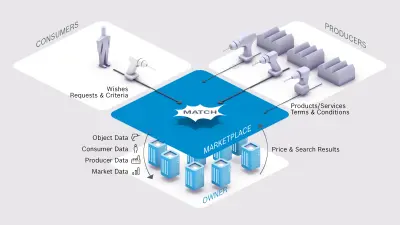
The operators of digital marketplaces are among the most valuable groups of companies in the world. Their market dominance is based on strong mechanisms that are difficult to break, give them a monopoly position and can be detrimental to market participants. The “Economy of Things” team at Bosch Research is investigating what these mechanisms are and how they could be changed.
Bitkom paper with use cases for master data and certificate management from Bosch
06.07.2020 | Motivation/principles
The Bundesverband Informationswirtschaft, Telekommunikation und neue Medien e.V. (the German industry association for information technology, telecommunications, and new media) – Bitkom for short – has published a paper presenting real-life application scenarios involving self-sovereign identity (SSI) that have already reached a very advanced stage of implementation. In simple terms, SSI means that users manage their digital identity themselves, without relying on a central identity provider. This is also a matter of crucial importance for the “Economy of Things” (EoT) research team, a strategic advance engineering project at Bosch Research. In its article, Bitkom clearly outlines the advantages of companies sharing, validating, and updating master data and supplier certificates automatically in line with the SSI principle.

Self-sovereign identities with verifiable credentials enable any person, organization, or thing to interact directly with any other entity in a way that is reliable and preserves privacy. Image source: © Depositphotos.com/peshkova
Research paper validation of crypto-based systems
04.11.2019 | Motivation/principles
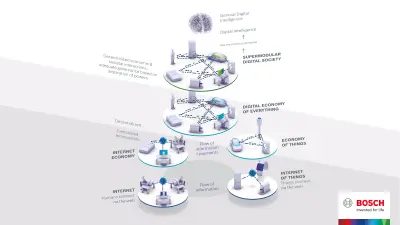
On the importance of system-view centric validation for the design and operation of a crypto-based digital economy.


